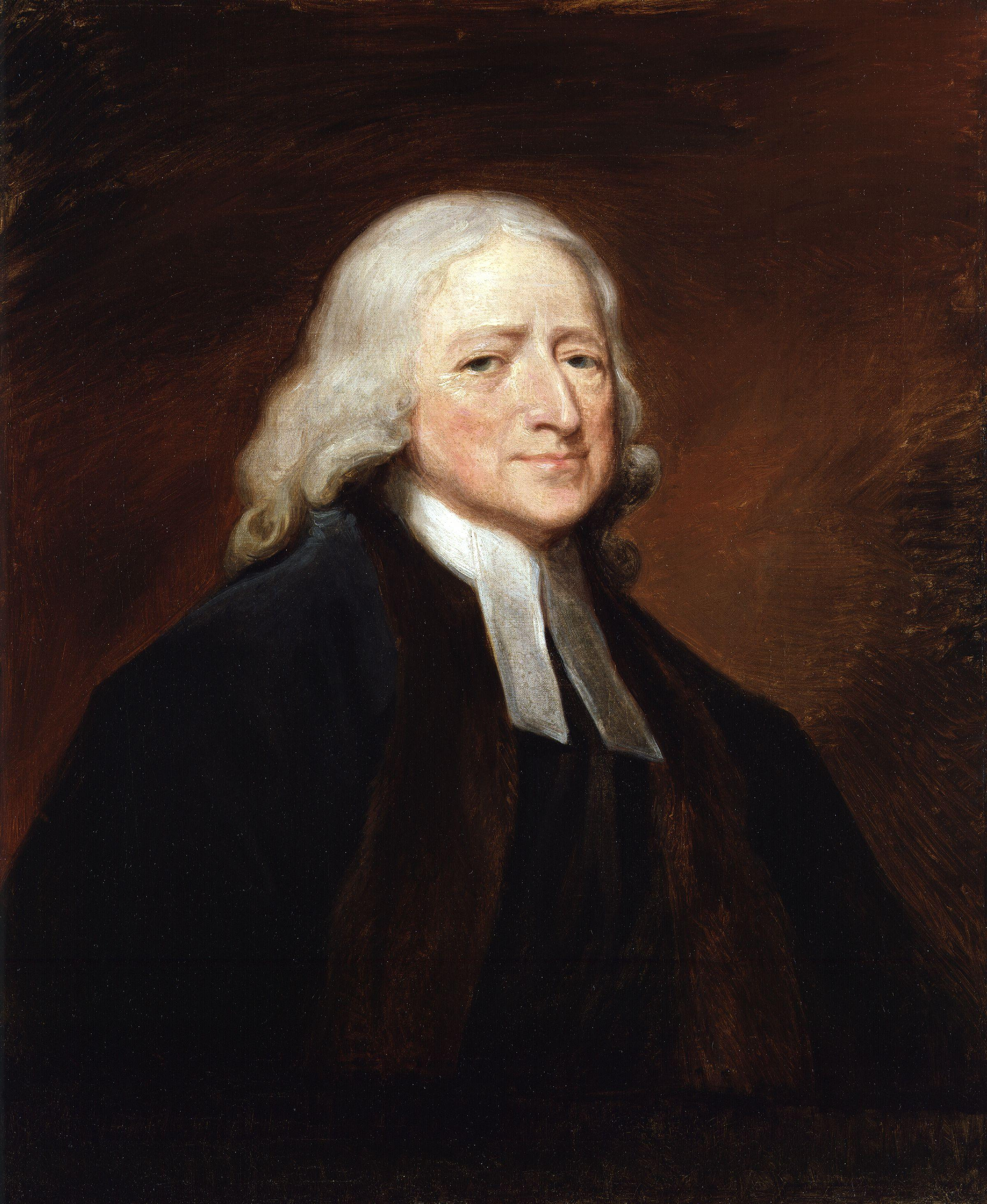John Wesley Frases famosas
“Qualquer que seja a causa natural, o pecado é a verdadeira causa de todos os terremotos.”
and sin the moral cause of earthquakes, ( whatever the natural cause may be)
"Sermão CXXXVIII" (1750) in "The works of the Rev. John Wesley", Volume 7 - Página 384 http://books.google.com.br/books?id=T-I7AAAAYAAJ&pg=RA1-PA384, John Wesley - J. & J. Harper, 1826
“Considero o mundo inteiro como a minha paróquia.”
I look upon all the world as my parish
citado em "The life of the Rev. John Wesley, M.A.: some time fellow of Lincoln College ..." - Página 851 http://books.google.com/books?pg=PA851&id=ndsGAAAAYAAJ, de John Whitehead e Thomas Hewlings Stockton, publicado por J.E. Beardsley, 1793, 572 páginas
John Wesley: Frases em inglês
“God grant that I may never live to be useless!”
Fonte: How To Pray: The Best of John Wesley on Prayer
Fonte: How To Pray: The Best of John Wesley on Prayer
“I am always in haste, but never in a hurry.”
As quoted in the "Saturday Review" (28 November 1874)
General sources
Fonte: John Wesley's Sermons: An Anthology
As quoted in England in the Eighteenth Century (1714 - 1815) (1964) by J. H. Plumb, p. 94
General sources
Letter to Charles Wesley
General sources
Nehemiah Curnock, ed., 'The Journal of the Rev. John Wesley, A.M.', London, Charles H. Kelly, vol. 5, p. 265 https://archive.org/stream/a613690405wesluoft#page/265/mode/1up (entry of 25 May 1768)
General sources
“The Church recruited people who had been starched and ironed before they were washed.”
John Wesley Lord, as quoted in TIME magazine (1 February 1963)
Misattributed
Letter to a Roman Catholic, July 18, 1749, The works of the Rev. John Wesley (1872), London, Wesleyan Conference Office, vol. X, p. 81. https://books.google.com/books?id=TZBKAAAAYAAJ&pg=PA81&dq=%22continued+a+pure+and+unspotted+virgin%22&hl=en&sa=X&ved=0ahUKEwjn7srt5I_NAhUUU1IKHUlzC-AQ6AEIUTAH#v=onepage&q=%22continued%20a%20pure%20and%20unspotted%20virgin%22&f=false
General sources
Wesley quoting his own sermon on "The Circumcision of the Heart" (1 January 1733) in the work A Plain Account Of Christian Perfection (Edition of 1777)
General sources
Letter to a Roman Catholic Priest, published in his Journal for 27 August 1739 http://books.google.com/books?id=TylXAAAAIAAJ&q=%22+published+in+his+Journal+for+27+August+1739%22&dq=%22+published+in+his+Journal+for+27+August+1739%22&hl=en&ei=ggg-TMSKNcL6lwfw3cj3BQ&sa=X&oi=book_result&ct=book-thumbnail&resnum=1&ved=0CC8Q6wEwAA.
In, The works of the Rev. John Wesley, A. M., London, Wesleyan Conference Office, 1872, vol. 1, p. 220. http://books.google.com/books?id=Eo9KAAAAYAAJ&pg=PA220&dq=%22+I+can+by+no+means+approve+the+scurrility+and+contempt+with+which+the+Romanists%22&hl=en&ei=iwM-TOq7OcP7lwfr6Kz5BQ&sa=X&oi=book_result&ct=result&resnum=5&ved=0CDkQ6AEwBA#v=onepage&q=%22%20I%20can%20by%20no%20means%20approve%20the%20scurrility%20and%20contempt%20with%20which%20the%20Romanists%22&f=false http://wesley.nnu.edu/John_Wesley/letters/1739.htm
General sources
Sermon 37 "The Nature of Enthusiasm"
Sermons on Several Occasions (1771)
“Why should the Devil have all the best tunes?”
Attributed to Wesley in The English Poets: Addison to Blake (1880) by Thomas Humphry Ward, it also sometimes attributed to his brother Charles Wesley, and appears even earlier attributed to George Whitefield, in The Monthly Review, or, Literary Journal, Vol. 49 (June 1773 - January 1774), p. 430; this has also been reported as a remark made by Rowland Hill, when he arranged an Easter hymn to the tune of "Pretty, Pretty Polly Hopkins, in The Rambler, Vol. 9 (1858), p. 191; as well as to William Booth, who popularized it as an addage in promoting The Salvation Army.
Disputed
Sermons on Several Occasions (1771)
Fonte: Sermon 37 "The Nature of Enthusiasm" http://www.ccel.org/ccel/wesley/sermons.v.xxxvii.html
“God buries his workmen, but carries on his work.”
Charles Wesley, as quoted in Cyclopaedia of Biblical, Theological, and Ecclesiastical Literature (1889). This appears with two quotes of John Wesley on the monument to both men in Westminster Abbey, and is commonly attributed to John.
Misattributed
“You may be as orthodox as the devil and as wicked.”
This may be a paraphrase or summary of Wesley's thoughts that originated with Hugh Price Hughes; in his preface to Ethical Christianity : A Series of Sermons (1892) he states "It is really quite surpising that one could honestly confound Orthodoxy with Christianity, because, as John Wesley used to say in his emphatic and decisive manner, you may be as orthodox as the devil and as wicked." He does not place the statement itself in quotes, though his daughter, Dorothea Price Hughes, in her book The Life of Hugh Price Hughes (1904), p. 146, states "The saying of Wesley's that a man may be as orthodox as the devil and as wicked, was one in which he delighted, and which he often quoted." No published sources of the statement prior to 1892 have yet been located.
Disputed
Reported in Josiah Hotchkiss Gilbert, Dictionary of Burning Words of Brilliant Writers (1895), p. 285
General sources
A Survey of the Wisdom of God in the Creation; Or A Compendium of Natural Philosophy New York: Bangs and T. Mason, 1823, Part the Second, Chapter I, volume 1, pages 147-148. Wesley Center Online http://wesley.nnu.edu/john-wesley/a-compendium-of-natural-philosophy/chapter-1-of-beasts/
General sources
“In all cases, the Church is to be judged by the Scripture, not the Scripture by the Church.”
Popery Calmly Considered (1779): The works of the Rev. John Wesley, 1812, London : Printed at the Conference - Office … by Thomas Cordeux, agent, vol. XV http://books.google.com/books?vid=OCLC09022224&id=CZEPAAAAIAAJ&pg=PA180&lpg=PA177&dq=%22popery+calmly+considered%22, p. 180 - Google Books
General sources
Journal entry (1 August 1777), published in The Journal of the Rev. John Wesley (1827), p. 104
General sources
As quoted in A Dictionary of Thoughts : Being a Cyclopedia of Laconic Quotations from the Best Authors of the World, both Ancient and Modern (1908) by Tyron Edwards, p. 127
General sources
“Every one, though born of God in an instant, yet undoubtedly grows by slow degrees.”
Letter (27 June 1760), published in The Works of the Rev. John Wesley (1813) Vol. XVI, p. 109
As quoted in an 1856 edition of Works
General sources
Variante: Every one, though born of God in an instant, yea, and sanctified in an instant, yet undoubtedly grows by slow degrees.
Fonte: A Plain Account of Christian Perfection (1766)
